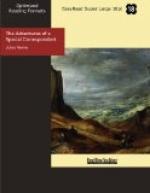“Probably.”
“Well, Monsieur Bombarnac, if I am not taking too great a liberty, may I ask a favor of you?”
“What is it?”
“That you will be present at the departure of the case, so as to avoid any mistake.”
“I will be there, Kinko, I will be there. Glass fragile, I will see that they don’t handle it too roughly. And if you like I will accompany the case to Avenue Cha-Coua—”
“I hardly like to ask you to do that—”
“You are wrong, Kinko. You should not stand on ceremony with a friend, and I am yours, Kinko. Besides, it will be a pleasure to me to make the acquaintance of Mademoiselle Zinca Klork. I will be there when they deliver the box, the precious box. I will help her to get the nails out of it—”
“The nails out of it, Monsieur Bombarnac? My panel? Ah, I will jump through my panel!”
A terrible clap of thunder interrupted our conversation. I thought the train had been thrown off the line by the commotion of the air. I left the young Roumanian and regained my place within the car.
In the morning—26th of May, 7 A.M.—we arrived at Lan-Tcheou. Three hours to stop, three hours only.
“Come, Major Noltitz, come, Pan-Chao, come, Caterna, we have not a minute to spare.”
But as we are leaving the station we are stopped by the appearance of a tall, fat, gray, solemn personage. It is the governor of the town in a double robe of white and yellow silk, fan in hand, buckled belt, and a mantilla—a black mantilla which would have looked much better on the shoulders of a manola. He is accompanied by a certain number of globular mandarins, and the Celestials salute him by holding out their two fists, which they move up and down as they nod their heads.
“Ah! What is this gentleman going to do? Is it some Chinese formality? A visit to the passengers and their baggage? And Kinko, what about him?”
Nothing alarming, after all. It is only about the treasure of the Son of Heaven. The governor and his suite have stopped before the precious van, bolted and sealed, and are looking at it with that respectful admiration which is experienced even in China before a box containing many millions.
I ask Popof what is meant by the governor’s presence, has it anything to do with us?
“Not at all,” says Popof; “the order has come from Pekin to telegraph the arrival of the treasure. The governor has done so, and he is awaiting a reply as to whether he is to send it on to Pekin or keep it provisionally at Lan-Tcheou.”
“That will not delay us?”
“I don’t think so.”
“Then come on,” said I to my companions. But if the imperial treasure was a matter of indifference to us, it did not seem to be so to Faruskiar. But whether this van started or did not start, whether it was attached to our train or left behind, what could it matter to him? Nevertheless, he and Ghangir seemed to be much put about regarding it, although they tried to hide their anxiety, while the Mongols, talking together in a low tone, gave the governor anything but friendly glances.




